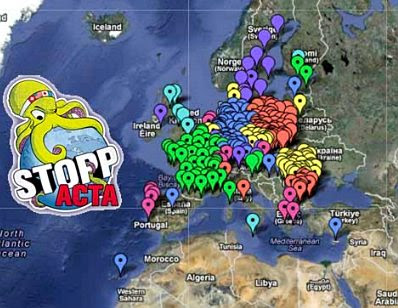The equivalent of SOPA in the European Union is ACTA (the Anti-Counterfeiting Trade Agreement). Since the EU has no democratically elected deliberative body responsible for proposing legislation, the implementation of ACTA has to be accomplished by other means. The initiative is vulnerable to the decision by any individual country to withdraw from ratification, which is exactly what Poland has just done.
Many thanks to JLH for translating this recent article from Junge Freiheit:
Net Community Gears Up for Demonstrations on the Weekend
The map indicates the demonstrations thus far announced for February 11th and the logo of ACTA opponents
Berlin — The internet community in Germany is preparing for a number of rallies on the coming weekend. Thus far 55 demonstrations for February 11th against the Anti-Counterfeiting Trade Agreement (Acta) have been announced. Just in Germany. It could be the largest demonstration of this kind ever.
Acta is an agreement made behind closed doors on the initiative of the USA, which is now supposed to take effect after being initialed by most EU states. Among other things, Acta would make internet providers responsible for the actions of their clients. They would be obliged to bar any user who has offended against copyright law. The new regulations could also rescind mail secrecy and make sites like Youtube impossible, say critics.
Poland has exited
The relevant formulations in the text of the agreement are very vague, whatever proponents may say. The feared measure cannot be effected with this agreement, says Justice Minister Sabine Leutheusser-Scharrenberger (FDP). The Europe-wide resistance is now gathering against the agreement, on which the Bundestag has yet to vote. In the front line are the internet community and organizations like the Pirate Party or Anonymous which are in all-out attack mode against it. Cleverly, leftist parties like the Greens have made the cause their own, but also the Youth Union (Junge Union) is demanding; “Acta ad acta legen!” (Make Acta inactive).
Poland has already withdrawn from the ratification process after repeated mass demonstrations there which were hardly reported at all in the German media.


3 comments:
In the U.S. Constitution, Congress is given legal authority "To promote the Progress of Science and useful Arts, by securing for limited Times to Authors and Inventors the exclusive Right to their respective Writings and Discoveries;" among other things.
Of course, the particular wording of the Constitution does not have legal force in the deliberation of what powers the EU may legitimately exercise over the reproduction, transmission, and exchange of information in a nominally free society. But I do feel that it serves as a useful starting point.
First, this clause of the Constitution concisely expresses the reason that the power is granted, "To promote the Progress of Science and useful Arts," by the creation of specific legislation respecting intellectual property rights. The clause goes on to detail the mechanism of legislation that is permitted, "by securing for limited Times to Authors and Inventors the exclusive Right to their respective Writings and Discoveries".
There are three points that specifically limit the use of this power. First, "the exclusive Right" may only be secured for a limited time. Second, this right may only be secured "to Authors and Inventors". And third, the right is exclusive, it cannot be transmitted to any other person or organization.
The reasoning here should be obvious. First, if the intellectual property rights were reserved indefinitely, this would tend to retard rather than promote the progress of Science and the Arts (whether useful or not). Second, if the rewards of intellectual property rights were not specifically assigned to the actual authors and inventors of writings and discoveries, then there would be no special incentive to be a creator rather than an exploiter of such advances. And third, if the rights were not exclusive, then there would be no incentive to concentrate on innovations a given author or inventor might reasonably develop rather than grabbing all the possible IP rights one could, to be sold off to those wanting to make use of them.
It may be observed that the principles on which existing intellectual property law (in the U.S. as much or more than internationally) are constructed to run absolutely opposite all of these purposes. Intellectual property rights are not secured to individual creators, but to large corporations that force those creators into grossly unfair contracts. Because of constant extensions in the length of protection, intellectual property rights do not expire after any set period and many do not expire at all. And, worst of all, because the rights of development of an innovation may be freely traded once established, those who have the talent and insight to make a real contribution to a field must often buy the rights at an inflated price from some legal entity that has acquired them as a middleman.
Far from promoting the progress of science and useful arts, the existing paradigm of intellectual property rights tends to stifle innovation and reward a plethora of useless novelties in its place.
Chiu Chun-Ling.
There's a petition here.
http://www.avaaz.org/en/eu_save_the_internet_spread/?sbc
1,842,326 signed.
Say NO to ACTA:
Foarte bine ca sustineti miscare asta,cu cat suntem mai multi cu atat o sa se teme mai tare de noi.
Aici cateva video referitoare la A.C.T.A,SOPA:
B.A.S & B.M.B – Un indemn la libertate (Stop ACTA)
http://www.youtube.com/watch?v=jtsuRaFxWQA
Comunitatea ON-LINE din Romania spune STOP A.C.T.A.
http://www.youtube.com/watch?feature=player_embedded&v=link extern
http://www.youtube.com/watch?v=sLRqD9TjBAM&feature=relalink extern
Anti ACTA protests across Europe on 02/11/2012 - Summary
https://www.youtube.com/watch?v=IsLbwkhwk9w
Post a Comment